Friday Sermon: Catastrophe Is An “Oral”
First Sermon
I الحمد لله الذي من توكل عليه بصدق نية كفاه ومن توسل إليه باتباع شريعته قربه وأدناه ومن استنصره على أعدائه وحسدته نصره وتولاه والصلاة والسلام على سيدنا محمد وعلى آله وأصحابه ومن حافظ دينه وجاهد في سبيل الله أما بعد فياأيها المسلمون, اتقواالله حق تقاته ولاتموتن إلا وأنتم مسلمون فقد قال الله تعالى في كتابه الكريم: اقرأ باسم ربك الذي خلق, خلق الإنسان من علق, اقرأ وربك الأكرم
Nothing is wasted throughout God created. These words are true because all existence in this universe has a purpose and a purpose, whether known to humans or not.
Also Read: Ustaz Abdul Somad in Pekanbaru: It’s Time to Embrace Hijrah
This includes all members of the human body, such as the eyes, nose, ears, mouth, feet, hands, and external and internal organs, as well as countless cells.
All of that is a great blessing. Favor that cannot possibly be reciprocated in proportion, except just being grateful for it, either through words or deeds.
Gratitude through words can be done by saying hamdalah or other words of praise while giving thanks through actions will be reflected in the quality of the action: is it good, beneficial, or vice versa?
The Friday prayer congregation rahimakumullâh
Also Read: Friday Sermon: Jews, Children of Israel, and People of the Book
Among all the members of the body the most crucial is oral. Oral is a device in the human body that can cause benefits, but at the same time great harm if is not properly used.
Because of that there is an Arabic proverb that says, salâmatul insan fî hifdhil lisân (a person’s safety depends on his speech). Through words, someone can help others. And through words a person can cause harm not only to himself but also to others. Because it is so crucial, Islam even gives only two choices regarding oral functions: to say what is good or just keep quiet.
As the hadith narrated by Imam al-Bukhari says: وَمَنْ كَانَ يُؤْمِنُ بِاللهِ وَالْيَوْمِ اْلآخِرِ فَليَــقُلْ خَـيْرصًـ أَوْ لمِيَـ
Rasulullah preceded him by expressing faith before warning about how best to use oral. Faith is fundamental to Muslims. This shows that oral affairs are no joke.
The above hadith can be understood on the contrary (mafhum mukhalafah) that people cannot say good so it is questionable the quality of their faith in Allah and the Last Day.
Also Read: Friday Sermon: Hijrah in the Struggle for the Liberation of Al-Aqsa and Palestine
This is interesting because oral is related to theology. Why is it associated with faith in Allah and the hereafter? This is about the message that all the words that humans issue are always under God’s control.
That saying also contains accountability, not only in this world but in the hereafter as well. The person who speaks recklessly, without considering the harm, indicates disregard for the belief that Allah is always present witnessing and the day of vengeance is sure to come.
Allah also sends special angels to watch over our every word. مَا يَلْفِظُ مِنْ قَوْلٍ إِلَّا لَدَيْهِ رَقِيبٌ عَتِيدٌ “Not a single sentence was uttered but there was a watchful angel nearby who was always present.” (QS. Qaf: 18)
Many dirty things can arise from speech. Like gibah or talking about other people’s badness. Gibah may be for some people fun as a chatterbox, but it puts the reputation of others at risk, fosters hatred, and destroys the trust and respect of others.
Also Read: Sadaqah, A Simple Act with Extraordinary Virtues: Dr. Wahyudi KS
Another example is slander. Namely, always spreading false news with the intention of harming the slandered party. Slander generally ends in fighting one another, to quarrels and even murder. Islam hates this trait.
Slander falls into the category of lying but on a more painful level. This is the relevance of a human being endowed with common sense, so that he thinks about everything he does or says.
Think about the value of kindness in the words that we will say, as well as the impact that will arise after the words are uttered. This is important to note so that mistakes do not multiply due to unprotected human speech.
Politicians who often break promises are bad, but it will be even worse if they are also not good at keeping their mouths running.
Also Read: The Dynamics of Living in a Muslim Community in the Modern Era
An official who likes to lie is bad but it is even worse if he is also good at talking. Etc.
The Messenger of Allah said: إِنَ أَخْوَفَ مَا أَخَـافُ عَلَيْــكُمْ بَعْدِيْ كُلُّ مُنَافِقٍ عَلِـيمُ اللِّسَان “
I really worry about all of you people who are very worried about you.
Friday prayer congregation rahimakumullâh,
Also Read: The Meaning of “Minal Aidin wal Faizin”
In modern times, speech or utterance does not only come from the mouth but also from Facebook status, tweets on Twitter, memes on Instagram, video content, and so on.
Social media is also a busy place to do backbiting, slander, spread lies, provocation of hatred, even physical threats.
The meaning of spoken word also extends to include devices in cyberspace that actually represent our speech.
The impact is the same, starting from fighting against each other, tarnishing the dignity of others, to civil war.
Also Read: The Atrocities of Zionist Israel During Ramadan
Therefore, we should be careful about what we say or write on social media. Thinking and tabayyun (clarification) is an attitude that must be done to ensure that what we do is of great value, or at least does not cause harm.
Once again, remember that Allah sends special angels to watch over our speech, both the results of our speech and the typing of our fingers on social media.
مَا يَلْفِظُ مِنْ قَوْلٍ إِلَّا لَدَيْهِ رَقِيبٌ عَتِيدٌ ”
Not a single sentence was uttered but there was a watchful angel nearby who was always present” (QS. Qaf: 18).
Also Read: Imaam Yakhsyallah Explains the Interpretation of Quran Surah Asy-Shura Verses 13-15
باَرَكَ اللهُ لِيْ وَلكمْ فِي القُرْآنِ العَظِيْمِ، وَنَفَعَنِيْ وَإِيّاكُمْ بِالآياتِ والذِّكْرِ الحَكِيْمِ. إنّهُ تَعاَلَى جَوّادٌ كَرِيْمٌ مَلِكٌ بَرٌّ رَؤُوْفٌ رَحِيْمٌ
Second Sermon
اَلْحَمْدُ للهِ عَلىَ إِحْسَانِهِ وَالشُّكْرُ لَهُ عَلىَ تَوْفِيْقِهِ وَاِمْتِنَانِهِ. وَأَشْهَدُ أَنْ لاَ اِلَهَ إِلاَّ اللهُ وَاللهُ وَحْدَهُ لاَ شَرِيْكَ لَهُ وَأَشْهَدُ أنَّ سَيِّدَنَا مُحَمَّدًا عَبْدُهُ وَرَسُوْلُهُ الدَّاعِى إلىَ رِضْوَانِهِ. اللهُمَّ صَلِّ عَلَى سَيِّدِنَا مُحَمَّدٍ وِعَلَى اَلِهِ وَاَصْحَابِهِ وَسَلِّمْ تَسْلِيْمًا كِثيْرًا أَمَّا بَعْدُ فَياَ اَيُّهَا النَّاسُ اِتَّقُوااللهَ فِيْمَا أَمَرَ وَانْتَهُوْا عَمَّا نَهَى وَاعْلَمُوْا أَنَّ اللهَ أَمَرَكُمْ بِأَمْرٍ بَدَأَ فِيْهِ بِنَفْسِهِ وَثَـنَى بِمَلآ ئِكَتِهِ بِقُدْسِهِ وَقَالَ تَعاَلَى إِنَّ اللهَ وَمَلآئِكَتَهُ يُصَلُّوْنَ عَلىَ النَّبِى يآ اَيُّهَا الَّذِيْنَ آمَنُوْا صَلُّوْا عَلَيْهِ وَسَلِّمُوْا تَسْلِيْمًا. اللهُمَّ صَلِّ عَلَى سَيِّدِنَا مُحَمَّدٍ صَلَّى اللهُ عَلَيْهِ وَسَلِّمْ وَعَلَى آلِ سَيِّدِناَ مُحَمَّدٍ وَعَلَى اَنْبِيآئِكَ وَرُسُلِكَ وَمَلآئِكَةِ اْلمُقَرَّبِيْنَ وَارْضَ اللّهُمَّ عَنِ اْلخُلَفَاءِ الرَّاشِدِيْنَ أَبِى بَكْرٍ وَعُمَر وَعُثْمَان وَعَلِى وَعَنْ بَقِيَّةِ الصَّحَابَةِ وَالتَّابِعِيْنَ وَتَابِعِي التَّابِعِيْنَ لَهُمْ بِاِحْسَانٍ اِلَىيَوْمِ الدِّيْنِ وَارْضَ عَنَّا مَعَهُمْ بِرَحْمَتِكَ يَا اَرْحَمَ الرَّاحِمِيْنَ اَللهُمَّ اغْفِرْ لِلْمُؤْمِنِيْنَ وَاْلمُؤْمِنَاتِ وَاْلمُسْلِمِيْنَ وَاْلمُسْلِمَاتِ اَلاَحْيآءُ مِنْهُمْ وَاْلاَمْوَاتِ اللهُمَّ أَعِزَّ اْلإِسْلاَمَ وَاْلمُسْلِمِيْنَ وَأَذِلَّ الشِّرْكَ وَاْلمُشْرِكِيْنَ وَانْصُرْ عِبَادَكَ اْلمُوَحِّدِيَّةَ وَانْصُرْ مَنْ نَصَرَ الدِّيْنَ وَاخْذُلْ مَنْ خَذَلَ اْلمُسْلِمِيْنَ وَ دَمِّرْ أَعْدَاءَالدِّيْنِ وَاعْلِ كَلِمَاتِكَ إِلَى يَوْمَ الدِّيْنِ. اللهُمَّ ادْفَعْ عَنَّا اْلبَلاَءَ وَاْلوَبَاءَ وَالزَّلاَزِلَ وَاْلمِحَنَ وَسُوْءَ اْلفِتْنَةِ وَاْلمِحَنَ مَا ظَهَرَ مِنْهَا وَمَا بَطَنَ عَنْ بَلَدِنَا اِنْدُونِيْسِيَّا خآصَّةً وَسَائِرِ اْلبُلْدَانِ اْلمُسْلِمِيْنَ عآمَّةً يَا رَبَّ اْلعَالَمِيْنَ. رَبَّنَا آتِناَ فِى الدُّنْيَا حَسَنَةً وَفِى اْلآخِرَةِ حَسَنَةً وَقِنَا عَذَابَ النَّارِ. رَبَّنَا ظَلَمْنَا اَنْفُسَنَاوَاِنْ لَمْ تَغْفِرْ لَنَا وَتَرْحَمْنَا لَنَكُوْنَنَّ مِنَ اْلخَاسِرِيْنَ. عِبَادَاللهِ ! إِنَّ اللهَ يَأْمُرُ بِاْلعَدْلِ وَاْلإِحْسَانِ وَإِيْتآءِ ذِي اْلقُرْبىَ وَيَنْهَى عَنِ اْلفَحْشآءِ وَاْلمُنْكَرِ وَاْلبَغْي يَعِظُكُمْ لَعَلَّكُمْ تَذَكَّرُوْنَ وَاذْكُرُوا اللهَ اْلعَظِيْمَ يَذْكُرْكُمْ وَاشْكُرُوْهُ عَلىَ نِعَمِهِ يَزِدْكُمْ وَلَذِكْرُ اللهِ أَكْبَرْ .(T/RE1)
Mi’raj News Agency (MINA)
Also Read: Imaam Yakhsyallah Mansur: Mosques Play a Central Role During Ramadhan











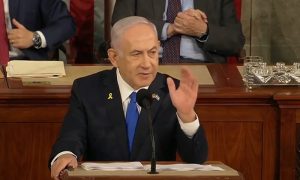





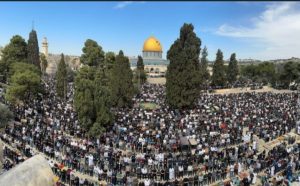
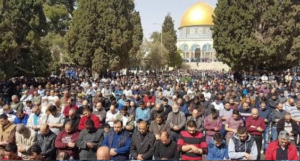
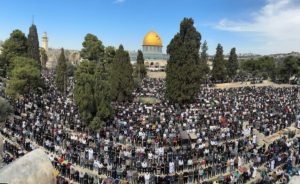
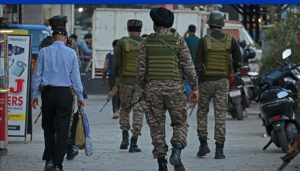






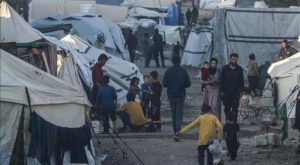







 Mina Indonesia
Mina Indonesia Mina Arabic
Mina Arabic